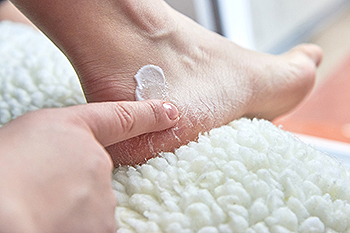 Heel fissures, also known as cracked heels, are the result of splitting and cracking on the skin of the heel. As the skin on the heel dries out, it loses its strength and elasticity, and it gets hard, dry, and flaky. Cracked heels can have a variety of causes that include standing for long periods of time, wearing shoes that don’t fit correctly, cold/dry weather, or obesity. If you are struggling with dry and cracked heels, applying moisturizer to the heels is the first key step in dealing with the situation. It is also important to use a pumice stone and/or liquid bandage on the affected area as well as avoiding harsh soaps and long harsh showers. In severe cases, cracked heels may require the help of a podiatrist who can help remove dead skin, prescribe stronger medicine, prescribe antibiotics, and suggest shoe inserts or heel pads. Therefore, if you are struggling with cracked heels don’t hesitate to visit a podiatrist for treatment recommendations.
Heel fissures, also known as cracked heels, are the result of splitting and cracking on the skin of the heel. As the skin on the heel dries out, it loses its strength and elasticity, and it gets hard, dry, and flaky. Cracked heels can have a variety of causes that include standing for long periods of time, wearing shoes that don’t fit correctly, cold/dry weather, or obesity. If you are struggling with dry and cracked heels, applying moisturizer to the heels is the first key step in dealing with the situation. It is also important to use a pumice stone and/or liquid bandage on the affected area as well as avoiding harsh soaps and long harsh showers. In severe cases, cracked heels may require the help of a podiatrist who can help remove dead skin, prescribe stronger medicine, prescribe antibiotics, and suggest shoe inserts or heel pads. Therefore, if you are struggling with cracked heels don’t hesitate to visit a podiatrist for treatment recommendations.
Cracked heels are unsightly and can cause further damage to your shoes and feet. If you have any concerns, contact one of our podiatrists from Summit Podiatry. Our doctors can provide the care you need to keep you pain-free and on your feet.
Cracked Heels
Cracked heels appear unappealing and can make it harder for you walk around in sandals. Aside from looking unpleasant, cracked heels can also tear stockings, socks, and wear out your shoes. There are several methods to help restore a cracked heel and prevent further damage.
How Do You Get Them?
Dry skin is the number one culprit in creating cracked heels. Many athletes, walkers, joggers, and even swimmers suffer from cracked heels. Age and skin oil production play a role to getting cracked heels as well.
Promote Healing
Over the counter medicines can help, especially for those that need instant relief or who suffer from chronic dry feet.
Wear Socks – Wearing socks with medicated creams helps lock in moisture.
Moisturizers – Applying both day and night will help alleviate dryness which causes cracking.
Pumice Stones – These exfoliate and remove dead skin, which allows for smoother moisturizer application and better absorption into the skin.
Change in Diet
Eating healthy with a well-balanced diet will give the skin a fresh and radiant look. Your body responds to the kinds of food you ingest. Omega-3 fatty acids and zinc supplements can also revitalize skin tissue.
Most importantly, seek professional help if unsure how to proceed in treating cracked heels. A podiatrist will help you with any questions or information needed.
If you have any questions, please feel free to contact one of our offices located in Wilmington, Whiteville, and Wallace, NC . We offer the newest diagnostic and treatment technologies for all your foot care needs.
